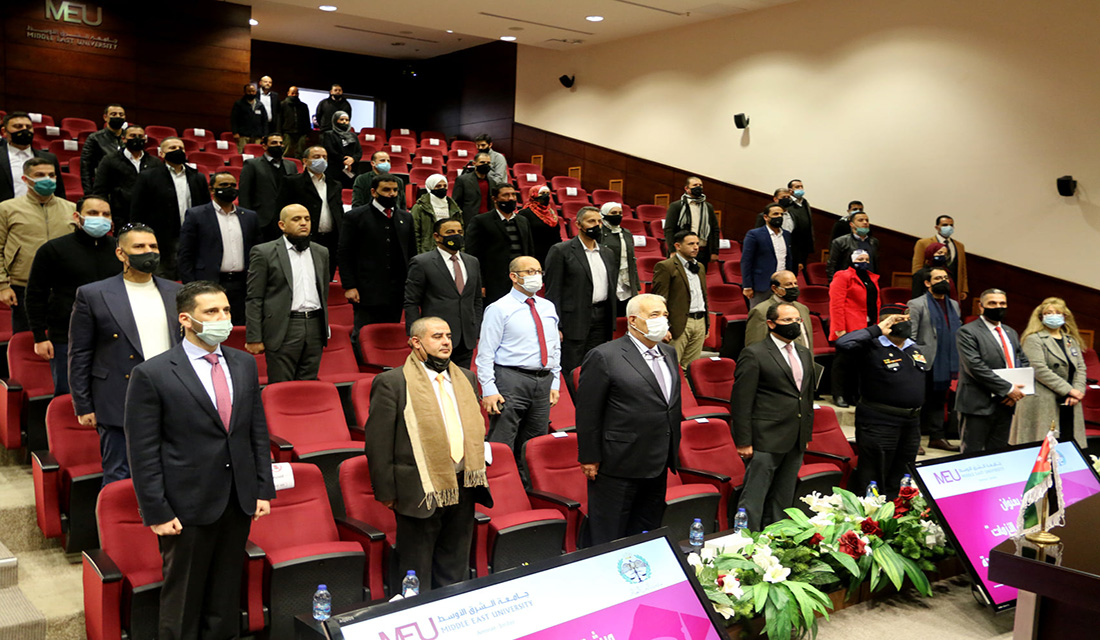
On Wednesday 27/1/2021, MEU organized a workshop entitled Crisis Management and Managing in Crises for the staff of the Security Strategic Studies Center, Public Security Directorate (PSD), in Yacoub Nasereddin Auditorium.
The workshop was commenced with a lecture by Dr. Yacoub Nasereddin, during which he spoke about the principle notions of strategic intelligence in crisis management, and how it can be utilized to overcome challenges in the best way possible. He explained that “strategic intelligence was first used in military operations in order to get as much information about the enemy movements as possible. Later, its use expanded to include political, economic and social areas.
Moreover, Dr. Yacoub stressed the importance of providing factual, real-time information to business leaders in order to enable rapid response and make accurate decisions. Furthermore, he pointed out the importance of prudent management in leading newly established economic, social, and political institutions, and how managing such institutions deliberately will enable the prediction of possible challenges and crises in the future; regardless of whether they were man-made or of natural cause. This, he explained, would help make proper preparations for confronting such crises or at least minimize their risk.
Dr. Nasereddin also praised the leading model of His Majesty King Abdullah II in managing the external crises that struck the region and reflected directly on the Jordanian state during the past few years. His Majesty sought through his prudent guidance to overcome all such challenges, starting from war on terrorism, to the Syrian refugee crisis, to the Covid-19 pandemic, and was successful in his endeavour thanks to his strategic intelligence. Such efforts were crowned by the establishment of the National Center for Security and Crisis Management a few years ago, which played an exceptional role in coordinating among different stakeholders during the past few decades and mitigating the repercussions of these crises. The session was concluded by opening the floor for discussion the questions of the audience.
In the second session, Dr. Talal Tayel Al-Abdallat lectured on “Crisis Management and Security Crises,” detailing the stages of crisis management and the importance of establishing a specialized crisis and disaster management unit composed of experienced, highly-trained team to tackle all the challenges related to crisis management.
Dr. Al-Abdallat stated that “planning is a fundamental requirement for security crisis management, and our security procedures and actions are only reactions to crime or any illegal act that inflicts damage on lives and assets.” The technological development, he added, and the accelerating advancement in the areas of telecommunication and information compel us to come up with an effective telecommunication system, on both internal and external levels, in order to predict the information that we should provide and the alarms we should raise in advance. This predictive-prevention approach to managing security crises helps avoid them before they even occur, and is enabled through a security system based on initiative, innovation and intensive training.
The workshop was concluded with the discussion of a handout distributed by Prof. Ahmad Ali Saleh entitled “Adopting a Strategic Scenario in Managing the Crisis Life Cycle.” He discussed the increase in the frequency of crises, their different kinds and areas (economic, political, social, and health-related), the increase in the figures of fatalities in crises, and the related expenses. He also explained MEU’s responsibility and its expected role in finding solutions and creating adequate strategies to counter crises, explaining that MEU has three roles: research, training, and dispersing knowledge.
He further explained the importance of the strategic scenario in crisis management and how it enables the prediction of potential future crises, and consequently formulating proactive solutions, finding alternative plans, and avoiding losses as much as possible.
MEU is a leading supporter of numerous public and private entities who benefit from the multidisciplinary expertise of its academic and training staff. This workshop is part of a MoU signed between MEU and the Public Security Directorate to facilitate the exchange of training and teaching expertise and contribute to the development of the Promising Police Leadership program.
